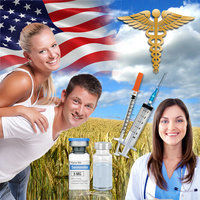Introduction
Testosterone Deficiency Syndrome (TDS), also known as hypogonadism, is a condition characterized by abnormally low levels of testosterone in men, which can lead to a variety of symptoms including decreased libido, erectile dysfunction, fatigue, and depression. Recent studies have begun to explore the potential environmental factors contributing to this condition, with a particular focus on the impact of organophosphate pesticides. This article delves into the relationship between organophosphate exposure and testosterone levels in American males, shedding light on a concerning public health issue.
The Prevalence of Organophosphate Pesticides
Organophosphate pesticides are widely used in agriculture to control pests and increase crop yield. In the United States, these chemicals are commonly found in fruits, vegetables, and other food products, as well as in the environment, leading to potential exposure for a significant portion of the population. Given their widespread use, understanding the health implications of organophosphate exposure is crucial.
Mechanisms of Action
Organophosphates primarily function as neurotoxic agents, targeting the nervous system by inhibiting acetylcholinesterase, an enzyme essential for nerve function. However, emerging research suggests that these chemicals may also interfere with the endocrine system, particularly affecting hormone regulation. Studies have shown that organophosphates can disrupt the hypothalamic-pituitary-gonadal axis, which plays a critical role in testosterone production.
Evidence Linking Organophosphates to Testosterone Deficiency
Several studies have investigated the association between organophosphate exposure and testosterone levels in men. A notable study published in the journal *Environmental Health Perspectives* found that men with higher levels of organophosphate metabolites in their urine had significantly lower testosterone levels compared to those with lower exposure. This correlation suggests that chronic exposure to organophosphates may contribute to the development of TDS.
Clinical Implications for American Males
The potential link between organophosphate exposure and testosterone deficiency has significant implications for American men, particularly those working in agriculture or living in areas with high pesticide use. Men experiencing symptoms of TDS should be screened for organophosphate exposure, and healthcare providers should consider this environmental factor when diagnosing and treating hypogonadism.
Strategies for Reducing Exposure
To mitigate the risks associated with organophosphate exposure, American males can take several steps. Consuming organic produce, which is grown without synthetic pesticides, can reduce dietary exposure. Additionally, wearing protective clothing and using proper safety equipment when working with pesticides can minimize occupational exposure. Public health initiatives aimed at reducing the use of organophosphates in agriculture and promoting safer alternatives are also essential.
Future Research Directions
While the existing evidence suggests a link between organophosphate exposure and testosterone deficiency, further research is needed to fully understand the mechanisms and long-term effects of these chemicals on male reproductive health. Longitudinal studies tracking organophosphate exposure and testosterone levels over time could provide more definitive evidence. Additionally, research into the impact of organophosphates on other aspects of male health, such as fertility and sexual function, is warranted.
Conclusion
The potential impact of organophosphate pesticides on testosterone levels in American males is a concerning public health issue that warrants further attention. As the prevalence of TDS continues to rise, understanding the role of environmental factors such as organophosphate exposure is crucial for developing effective prevention and treatment strategies. By raising awareness of this issue and promoting safer pesticide use, we can work towards protecting the reproductive health of American men.
Contact Us For A Fast And Professional Response

- Understanding Testosterone Deficiency: Symptoms, Diagnosis, and Treatment for American Men [Last Updated On: March 1st, 2025] [Originally Added On: March 1st, 2025]
- Testosterone Deficiency Impact on Muscle Mass in American Men: Diagnosis and Treatment [Last Updated On: March 17th, 2025] [Originally Added On: March 17th, 2025]
- Environmental Toxins Linked to Testosterone Deficiency in American Males [Last Updated On: March 17th, 2025] [Originally Added On: March 17th, 2025]
- Alcohol's Impact on Testosterone and TDS in American Males: A Comprehensive Analysis [Last Updated On: March 18th, 2025] [Originally Added On: March 18th, 2025]
- Testosterone Deficiency Syndrome: Symptoms, Diagnosis, and Management Strategies for American Men [Last Updated On: March 18th, 2025] [Originally Added On: March 18th, 2025]
- Testosterone Deficiency Syndrome: Impact on Energy and Treatment Options for American Men [Last Updated On: March 18th, 2025] [Originally Added On: March 18th, 2025]
- Stress-Induced Testosterone Deficiency in American Males: Causes, Effects, and Management [Last Updated On: March 19th, 2025] [Originally Added On: March 19th, 2025]
- Smoking's Impact on Testosterone Deficiency in American Males: Mechanisms and Mitigation [Last Updated On: March 20th, 2025] [Originally Added On: March 20th, 2025]
- Testosterone Deficiency Syndrome: Understanding and Managing with Hormone Therapy [Last Updated On: March 20th, 2025] [Originally Added On: March 20th, 2025]
- Testosterone Deficiency in Men: Symptoms, Prostate Health, and Treatment Options [Last Updated On: March 20th, 2025] [Originally Added On: March 20th, 2025]
- Testosterone Deficiency in American Men: Impacts on Mood and Treatment Options [Last Updated On: March 20th, 2025] [Originally Added On: March 20th, 2025]
- Weight Training Benefits for Men with Testosterone Deficiency Syndrome [Last Updated On: March 21st, 2025] [Originally Added On: March 21st, 2025]
- Chronic Illness Impact on Testosterone Levels in American Males: Management Strategies [Last Updated On: March 22nd, 2025] [Originally Added On: March 22nd, 2025]
- Testosterone Check-ups Crucial for American Males to Combat Deficiency Syndrome [Last Updated On: March 22nd, 2025] [Originally Added On: March 22nd, 2025]
- Testosterone Deficiency and Sleep Apnea: A Bidirectional Health Challenge for American Males [Last Updated On: March 22nd, 2025] [Originally Added On: March 22nd, 2025]
- Vitamin D's Role in Managing Testosterone Deficiency in American Males [Last Updated On: March 23rd, 2025] [Originally Added On: March 23rd, 2025]
- Testosterone Deficiency and Joint Health: Insights for American Males [Last Updated On: March 23rd, 2025] [Originally Added On: March 23rd, 2025]
- Magnesium's Role in Managing Testosterone Deficiency Syndrome in American Males [Last Updated On: March 23rd, 2025] [Originally Added On: March 23rd, 2025]
- Testosterone Deficiency Syndrome and Immune Function in American Men: A Comprehensive Overview [Last Updated On: March 23rd, 2025] [Originally Added On: March 23rd, 2025]
- Testosterone Deficiency Impacts Body Composition in American Males: Muscle, Fat, Bone [Last Updated On: March 24th, 2025] [Originally Added On: March 24th, 2025]
- Testosterone Deficiency Syndrome: Impacts on Skin Health and Management Strategies for American Men [Last Updated On: March 24th, 2025] [Originally Added On: March 24th, 2025]
- Soy Consumption and Testosterone Levels in American Males with TDS: A Complex Relationship [Last Updated On: March 24th, 2025] [Originally Added On: March 24th, 2025]
- Testosterone Deficiency Syndrome: Impacts and Management in American Male Athletes [Last Updated On: March 24th, 2025] [Originally Added On: March 24th, 2025]
- Shift Work's Impact on Testosterone Levels and Deficiency Syndrome in American Males [Last Updated On: March 24th, 2025] [Originally Added On: March 24th, 2025]
- Zinc's Vital Role in Combating Testosterone Deficiency in American Men [Last Updated On: March 24th, 2025] [Originally Added On: March 24th, 2025]
- Testosterone Deficiency Linked to Dental Health Issues in American Males [Last Updated On: March 24th, 2025] [Originally Added On: March 24th, 2025]
- Testosterone Deficiency in American Men: Impacts on Vision and Eye Health [Last Updated On: March 24th, 2025] [Originally Added On: March 24th, 2025]
- Testosterone Deficiency Syndrome: Impact on Cognitive Function in American Men [Last Updated On: March 25th, 2025] [Originally Added On: March 25th, 2025]
- Plasticizers' Impact on Testosterone Levels and TDS in American Men: A Review [Last Updated On: March 25th, 2025] [Originally Added On: March 25th, 2025]
- Testosterone Deficiency and Depression: A Critical Link in American Men's Health [Last Updated On: March 25th, 2025] [Originally Added On: March 25th, 2025]
- Omega-3 Fatty Acids: A Natural Approach to Managing Testosterone Deficiency in Men [Last Updated On: March 25th, 2025] [Originally Added On: March 25th, 2025]
- Testosterone Deficiency and Hair Loss: Understanding and Managing in American Men [Last Updated On: March 25th, 2025] [Originally Added On: March 25th, 2025]
- Pesticide Exposure Linked to Low Testosterone in American Men: Health Risks and Mitigation [Last Updated On: March 25th, 2025] [Originally Added On: March 25th, 2025]
- Air Pollution's Impact on Testosterone Levels in American Males: A Growing Concern [Last Updated On: March 26th, 2025] [Originally Added On: March 26th, 2025]
- Testosterone Deficiency Syndrome and Its Link to Hearing Loss in American Males [Last Updated On: March 26th, 2025] [Originally Added On: March 26th, 2025]
- Testosterone Deficiency and Anemia: Impacts and Management for American Males [Last Updated On: March 26th, 2025] [Originally Added On: March 26th, 2025]
- Testosterone Deficiency in American Males: Impacts on Memory and Cognitive Health [Last Updated On: March 26th, 2025] [Originally Added On: March 26th, 2025]
- Fenugreek: A Natural Solution for Testosterone Deficiency Syndrome in American Males [Last Updated On: March 26th, 2025] [Originally Added On: March 26th, 2025]
- Blue Light Exposure Linked to Testosterone Deficiency in American Men: Mitigation Strategies [Last Updated On: March 26th, 2025] [Originally Added On: March 26th, 2025]
- Chronic Stress and Testosterone Deficiency Syndrome in American Males: Impacts and Management [Last Updated On: March 26th, 2025] [Originally Added On: March 26th, 2025]
- Diet Soda Consumption Linked to Lower Testosterone Levels in American Men [Last Updated On: March 26th, 2025] [Originally Added On: March 26th, 2025]
- Testosterone Deficiency and Thyroid Dysfunction: Interconnected Health Issues in American Males [Last Updated On: March 26th, 2025] [Originally Added On: March 26th, 2025]
- Boron Supplementation: A Natural Approach to Managing Testosterone Deficiency in American Males [Last Updated On: March 27th, 2025] [Originally Added On: March 27th, 2025]
- Ashwagandha's Potential in Boosting Testosterone for American Males with TDS [Last Updated On: March 27th, 2025] [Originally Added On: March 27th, 2025]
- Testosterone Deficiency in American Men: Impacts, Diagnosis, and Treatment Options [Last Updated On: March 27th, 2025] [Originally Added On: March 27th, 2025]
- High-Fat Diets and Testosterone Levels: Impacts and Dietary Recommendations for American Males [Last Updated On: March 27th, 2025] [Originally Added On: March 27th, 2025]
- Testosterone Deficiency and Liver Health in U.S. Males: Impacts and Management Strategies [Last Updated On: March 28th, 2025] [Originally Added On: March 28th, 2025]
- TDS and Gallbladder Disease: Insights, Risks, and Management Strategies for American Males [Last Updated On: March 28th, 2025] [Originally Added On: March 28th, 2025]
- Testosterone Deficiency Syndrome: Impacts on Kidney Function and Management Strategies [Last Updated On: March 29th, 2025] [Originally Added On: March 29th, 2025]
- Testosterone Deficiency Syndrome: Impacts on Pancreatic Health and Cancer Risk in Men [Last Updated On: March 30th, 2025] [Originally Added On: March 30th, 2025]
- Heavy Metal Exposure and Its Impact on Testosterone Levels in American Men [Last Updated On: March 30th, 2025] [Originally Added On: March 30th, 2025]
- EMF Exposure and Testosterone Levels: Implications for TDS in American Males [Last Updated On: March 31st, 2025] [Originally Added On: March 31st, 2025]
- Tribulus Terrestris: A Promising Herbal Aid for Testosterone Deficiency in American Males [Last Updated On: April 1st, 2025] [Originally Added On: April 1st, 2025]
- Testosterone Deficiency Syndrome: Adrenal Health's Role and Management Strategies [Last Updated On: April 2nd, 2025] [Originally Added On: April 2nd, 2025]
- Testosterone Deficiency Syndrome: Impact, Diagnosis, and Management in American Men [Last Updated On: April 3rd, 2025] [Originally Added On: April 3rd, 2025]
- Noise Pollution Linked to Testosterone Deficiency in American Males: A Growing Concern [Last Updated On: April 5th, 2025] [Originally Added On: April 5th, 2025]
- Fluoride Exposure and Its Impact on Testosterone Levels in American Men [Last Updated On: April 6th, 2025] [Originally Added On: April 6th, 2025]
- Testosterone Deficiency Syndrome: Impacts on Hypothalamic Function and Management Strategies [Last Updated On: April 8th, 2025] [Originally Added On: April 8th, 2025]
- Testosterone Deficiency Syndrome: Impacts, Diagnosis, and Treatment in American Males [Last Updated On: April 10th, 2025] [Originally Added On: April 10th, 2025]
- DHEA Supplementation: A Promising Treatment for Testosterone Deficiency Syndrome in American Males [Last Updated On: April 10th, 2025] [Originally Added On: April 10th, 2025]
- BPA Exposure Linked to Lower Testosterone and TDS in American Men: A Review [Last Updated On: April 10th, 2025] [Originally Added On: April 10th, 2025]
- Ginseng's Potential in Managing Testosterone Deficiency Syndrome: A Comprehensive Overview [Last Updated On: April 10th, 2025] [Originally Added On: April 10th, 2025]
- Testosterone Deficiency and Pineal Gland: Insights for American Males with TDS [Last Updated On: April 10th, 2025] [Originally Added On: April 10th, 2025]
- Testosterone Deficiency Syndrome: Impacts on Urinary Health and Management Strategies [Last Updated On: April 10th, 2025] [Originally Added On: April 10th, 2025]
- Phthalates' Impact on Testosterone and TDS in American Males: An Emerging Concern [Last Updated On: April 11th, 2025] [Originally Added On: April 11th, 2025]
- Testosterone Deficiency Syndrome: Impacts on Gastrointestinal Health in American Males [Last Updated On: April 13th, 2025] [Originally Added On: April 13th, 2025]
- Testosterone Deficiency in American Males: Impacts on Respiratory Health and Management Strategies [Last Updated On: April 13th, 2025] [Originally Added On: April 13th, 2025]
- PFCs Linked to Testosterone Deficiency in American Males: Environmental Health Concerns [Last Updated On: April 14th, 2025] [Originally Added On: April 14th, 2025]
- Phytoestrogens' Impact on Testosterone Levels in American Men with Hypogonadism [Last Updated On: April 17th, 2025] [Originally Added On: April 17th, 2025]
- Testosterone Deficiency Syndrome: Impacts and Management in American Males [Last Updated On: April 17th, 2025] [Originally Added On: April 17th, 2025]
- Cordyceps: A Natural Approach to Managing Testosterone Deficiency Syndrome in Men [Last Updated On: April 17th, 2025] [Originally Added On: April 17th, 2025]
- Testosterone Deficiency Syndrome: Impacts on Metabolic Health and Management Strategies [Last Updated On: April 18th, 2025] [Originally Added On: April 18th, 2025]
- Triclosan Exposure Linked to Testosterone Decline in American Men: TDS Risks [Last Updated On: April 18th, 2025] [Originally Added On: April 18th, 2025]
- Parabens' Role in Testosterone Deficiency Syndrome Among American Males Explored [Last Updated On: April 19th, 2025] [Originally Added On: April 19th, 2025]
- Shilajit: A Natural Remedy for Testosterone Deficiency in American Males [Last Updated On: April 19th, 2025] [Originally Added On: April 19th, 2025]
- Testosterone Deficiency Syndrome: Impact of Endocrine Disruptors on American Males [Last Updated On: April 19th, 2025] [Originally Added On: April 19th, 2025]
- Testosterone Deficiency and Autoimmune Disorders: A Critical Link for American Males [Last Updated On: April 19th, 2025] [Originally Added On: April 19th, 2025]
- Testosterone Deficiency: Impacts on Neurological Health in American Males [Last Updated On: April 19th, 2025] [Originally Added On: April 19th, 2025]
- Testosterone Deficiency: Impacts on Skin, Hair, and Psychological Health in American Men [Last Updated On: April 21st, 2025] [Originally Added On: April 21st, 2025]
- Lifestyle Factors Impacting Testosterone Levels in American Males: A Multivariate Analysis [Last Updated On: April 23rd, 2025] [Originally Added On: April 23rd, 2025]

















